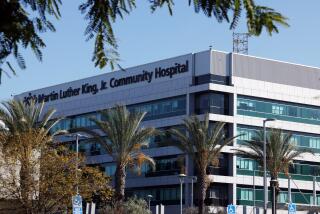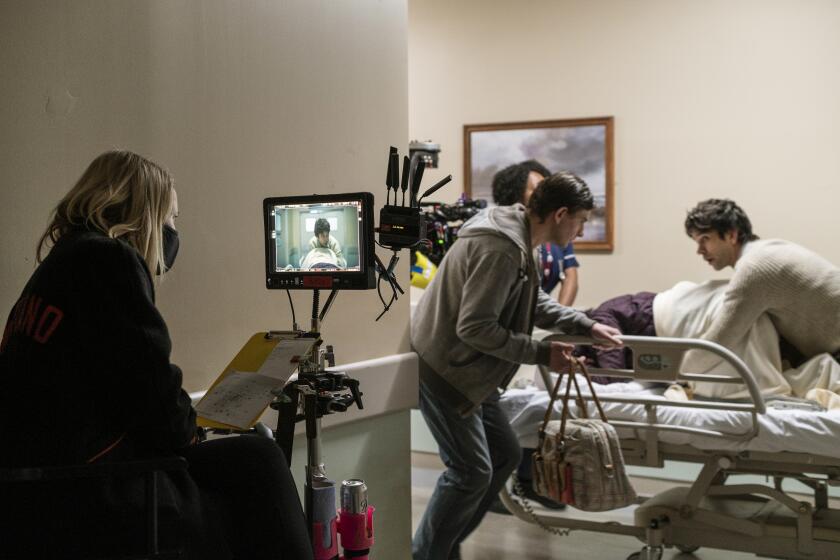Lap-Band surgery center tied to 1-800-GET-THIN loses accreditation

A Beverly Hills outpatient surgery center affiliated with the 1-800-GET-THIN ad campaign has lost its accreditation, a step that prohibits the center from performing many surgeries.
The Joint Commission denied accreditation to New Life Surgery Center, one of several Southern California clinics tied to the ad campaign that once blanketed local freeway billboards, television, radio and the Internet.
Five patients died after Lap-Band weight-loss surgeries at clinics affiliated with the ad campaign from 2009 to 2011, according to lawsuits, autopsy reports and other public records. Three of those surgeries were performed at the Beverly Hills clinic, which has used several names, most recently New Life Surgery Center.
Despite losing its accreditation, the clinic remained open this week. A paper sign on the glass front door said the clinic’s hours “vary,” but gave no indication of its accreditation difficulties. Several employees mingled behind a counter; no patients were in the lobby.
Under California law, outpatient surgery centers need to be accredited by one of four organizations, including the Joint Commission in Oakbrook Terrace, Ill. Without accreditation, the centers cannot perform surgeries with patients under general anesthesia.
Bret Coons, a spokesman for the Joint Commission, declined to say why the group revoked the accreditation of New Life Surgery Center. He said the decision became effective Aug. 7 and “all its review and appeal opportunities have been exhausted.”
Last year, the commission directed New Life Surgery Center to make several improvements, including in the areas of infection prevention, leadership and medication management, the group said at the time.
Mark Faulkner, an attorney for the surgery center, said in an email that his client “does not agree with the decision of the Joint Commission and believes that it is flawed on both factual and procedural grounds.”
“New Life Surgery Center is currently evaluating its options,” he said.
Betty Brown, whose sister died after Lap-Band surgery at the Beverly Hills facility in 2010, was pleased to learn its accreditation was denied, her attorney said.
“This is not a surprise. This facility has a history of problems,” said Brown’s attorney, Kathryn Trepinski. “My client is grateful that the Joint Commission has taken action so that hopefully other patients won’t be put at risk.”
The 1-800-GET-THIN advertising, which included the catchy jingle “Let your new life begin, call 1-800-GET-THIN,” was removed last year after the Food and Drug Administration warned several affiliated surgery centers that the ads failed to include adequate warnings about risks of the surgery.
The Lap-Band is a silicone ring that is surgically implanted around the stomach to discourage overeating. The surgeries are performed under general anesthesia.
Several lawsuits have said that 1-800-GET-THIN and the surgery centers were operated by brothers Julian and Michael Omidi.
The Omidis, both of whom hold medical degrees, have disciplinary records with the Medical Board of California.
Julian’s license to practice was revoked because he failed to disclose to the Medical Board that he had attended UC Irvine, which expelled him after his arrest in a campus burglary. Michael, who was placed on probation by the board from 2008 to 2011, faces a new allegation that could result in the loss of his license. He has denied wrongdoing.
The Omidis are also the subjects of a joint criminal investigation involving several federal and state law enforcement agencies, according to a court filing.
The investigation is focused on numerous “potential violations of federal law, including conspiracy, healthcare fraud, wire fraud, mail fraud, tax violations, identity theft [and] money laundering,” Samanta Kelley, a special agent for the FDA’s criminal division, said last year in an affidavit filed in a federal case in Los Angeles.
Thom Mrozek, a spokesman for the U.S. attorney’s office in Los Angeles, declined to comment on the status of that investigation. John Hueston, a lawyer who represents the Omidis, did not respond to a request for comment.







